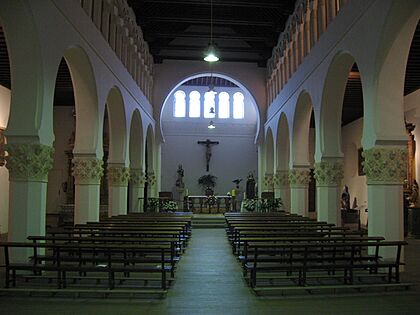Old main synagogue, Segovia facts for kids
Quick facts for kids Old Main Synagogue |
|
|---|---|
|
Spanish: Antigua Sinagoga Mayor
|
|

The inside of the building, which is now a church, as it looked in 2008.
|
|
| Religion | |
| Affiliation |
|
| Rite | Nusach Sefard |
| Ecclesiastical or organizational status | |
| Status |
|
| Location | |
| Location | 7 Plaza del Corpus, Segovia, Province of Segovia, Castile and León |
| Country | Spain |
| Architecture | |
| Architectural type | Synagogue architecture |
| Architectural style | Mudéjar |
| Completed |
|
| Destroyed | 1899 (by fire, subsequently restored) |
| Materials | Brick |
The Old Main Synagogue of Segovia is a historic building in Spain with a fascinating story. For many years, it was a place of worship for the Jewish community. Later, it was changed into a Catholic church called the Church of Corpus Christi.
Located in the old Jewish quarter of Segovia, this building has seen many changes over the centuries. It was built in the Middle Ages, survived a major fire, and has been carefully restored. Today, it stands as a reminder of the city's diverse history.
Contents
A Building's Long Journey
The synagogue was first built around the year 1373. It served as the main synagogue for the Jewish people of Segovia for several decades.
In the early 1400s, things began to change. In 1419, the city's rulers took over the building and turned it into a Catholic church. It was dedicated to Corpus Christi, which is a special holiday in the Catholic faith. A few years later, in 1421, the building was given to a nearby monastery.
The monastery eventually sold the building to two brothers. They transformed it into a convent for a group of nuns. The building that was once a synagogue is still part of that convent today.
Unique Architecture and Design
The Old Main Synagogue has a special design that tells its story. You don't enter directly from the street but through a quiet courtyard first.
Inside the Prayer Hall
The main prayer room was built in the 1300s. It is a large rectangular space. When it became a church, a main altar and a choir area were added.
The room is famous for its beautiful arches. Two rows of tall, graceful arches divide the space into three sections, called naves. These are horseshoe arches, meaning they are shaped like the letter U turned upside down, a common feature in Spanish architecture.
These arches are built in the Mudéjar style. This is a unique artistic style from Spain that blends Christian and Islamic designs. The arches are supported by eight-sided pillars. At the top of each pillar is a large, decorated piece called a capital. These capitals are covered in carvings of leaves and plants.
Surviving a Fire
In 1899, a terrible fire swept through the building, destroying almost everything. The beautiful decorations and the roof were lost.
Starting in 1902, people began the long process of restoring the building. During the cleanup, they found small, broken pieces of the original capitals. These fragments were like a puzzle, showing workers exactly how the original decorations looked. This allowed them to recreate the beautiful plant designs on the pillars. The final restoration was completed in 2004.
Inside the restored church, there is a large painting by the artist Vicente Cutanda. It is called Miracle in the synagogue and shows a famous local legend.
Gallery
See also
 In Spanish: Convento del Corpus Christi (Segovia) para niños
In Spanish: Convento del Corpus Christi (Segovia) para niños
- History of the Jews in Spain
- List of synagogues in Spain
 | Leon Lynch |
 | Milton P. Webster |
 | Ferdinand Smith |



